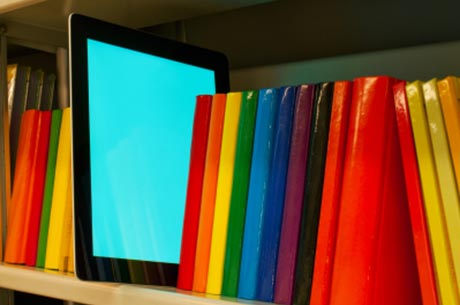有,我當(dāng)然有了。不是因?yàn)槲蚁敫淖儯乙廊幌矚g閱讀紙質(zhì)書的感覺,不過因?yàn)槲乙恢贝┧笥诟鱾€(gè)國(guó)家,所以一直帶著書不太實(shí)際,因?yàn)樘亓恕?/div>
薩拉:文本太小對(duì)我來(lái)說并不是困擾,因?yàn)槲业囊暳Ψ浅:谩?/div>
Peter: Some people swear by the Kindle, so you mentioned that you used one before, why did you stop using that?
彼得:有些人非常信賴Kindle,你剛才說你之前用過,那你為什么不再用了呢?
Sarah: It's a little heavier, a little bigger, a little heavier and so I tend not to carry it with me all the time so therefore I don't always have it with me. If I'm in my apartment I use the Kindle but if I'm out or on the bus or something like that then I'll just use my iTouch.
薩拉:因?yàn)樗悬c(diǎn)兒重,有點(diǎn)兒大,我不想一直帶著它,所以我不太常隨身攜帶。如果我在公寓里,我會(huì)用Kindle,但如果我在公交車上,我就會(huì)用iTouch。
Peter: Yeah because it's very pocket size really, isn't it?
彼得:嗯,因?yàn)閕Touch可以裝在口袋里,對(duì)吧?
Sarah: Yes, same size as a phone, so very convenient.
薩拉:沒錯(cuò),和手機(jī)的大小一樣,非常方便。
Peter: How about audio books, do you listen to any audio books?
彼得:那有聲書呢?你聽過有聲書嗎?
Sarah: Not really audio books but definitely audio, like language series so sort of like audio books. So when I'm trying to learn a language I listen to those a lot.
薩拉:應(yīng)該不算是有聲書,我聽過語(yǔ)言課程的音頻,相當(dāng)于有聲書吧。我在學(xué)語(yǔ)言的時(shí)候會(huì)經(jīng)常聽。
Peter: Oh, okay. Yeah, I like listening to audio book when I'm driving somewhere especially because they make long journeys go quicker. I guess when I'm travelling on the train or airplane then I like to read and then I often like to read on paper. It's funny, I think with the glare of the screen sometimes makes my eyes really tired when I have to read using my iPhone or tablet or something then. But yeah, most of the time it's fun to take everything along and see what you can read and enjoy different things I guess.
彼得:哦,好。我喜歡在開車的時(shí)候聽有聲書,因?yàn)檫@樣會(huì)讓長(zhǎng)途旅行變得更快。我坐火車或飛機(jī)出行時(shí),我喜歡閱讀,一般我會(huì)看報(bào)紙。這很有趣,我在用iPhone或平板電腦閱讀時(shí),屏幕發(fā)出的刺眼亮光有時(shí)讓我的眼睛感覺非常累。不過大部分時(shí)間隨身攜帶這些物品會(huì)帶來(lái)很多樂趣,因?yàn)榭梢蚤喿x不同的內(nèi)容,享受美好時(shí)光。
Sarah: What's the latest audio book that you've listened to?
薩拉:你最近聽的有聲書是什么?
Peter: I think I've listened to a series of comedy sketches. That's always funny because it keeps you awake while you're driving. And yeah, it's just a selection of comedy sketches and it's really entertaining. But that's the latest one I've listened to. I think before that I listened to, I think it was some kind of heavy ... some heavy linguistic topic that I was ... some book that I was interested in so yeah. And you?
彼得:我最近聽的是喜劇小品。非常搞笑,這使我在開車的時(shí)候保持清醒。我聽的是喜劇小品精選集,非常有趣。我最近聽的是這個(gè)。以前我聽過一些語(yǔ)言類的有聲書,我對(duì)這方面比較感興趣。你呢?
Sarah: I have never tried the audio book and I'm interested.
薩拉:我從來(lái)沒聽過有聲書,不過我有興趣試試。
Peter: You should, it's quite fun. Yeah, yeah.
彼得:你應(yīng)該嘗試一下,非常有趣。嗯。
Sarah: Yeah.
薩拉:好的。

譯文屬可可原創(chuàng),僅供學(xué)習(xí)交流使用,未經(jīng)許可請(qǐng)勿轉(zhuǎn)載












